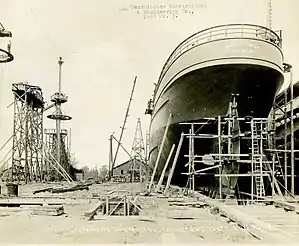Poplar Island is an uninhabited island located at the east end of the northern arm of the Fraser River in the City of New Westminster,[1] British Columbia. It is the last large undiked island in the Fraser River's North Arm.
History

In 1879, the federal government allocated four reserves to people from "All Coastal Tribes", and designated the "common reserve" as the New Westminster Indian Band, which included 27 acres (110,000 m2) on Poplar Island.[2] The reserve on Poplar Island was used as an Aboriginal smallpox victim quarantine area and a cemetery. Informants from the New Westminster Indian Band identified the reserve as a site of burials for people from the Kwantlen First Nation.[3] For decades, the Poplar Island reserve was designated as belonging to "all coast tribes".[4]
During World War I the New Westminster Construction and Engineering Company built both a massive shipyard on the island and a bridge connecting it to New Westminster. During the war years, hundreds of workers built, among other things, four warships for the government of France.[4] Cargo vessels built in the shipyard include the War Kitimat, War Comox, War Edensaw, and the War Ewen.[5][6] Ship launching ways are still visible on the island’s upriver end.[7]
The B.C. government included the island in its "nature legacy" program in 1995, and it was to be held by the Metro Vancouver's park department as a strictly protected nature reserve, in perpetuity.[4]
References
- ↑ "Poplar Island". BC Geographical Names.
- ↑ "Uncovering her roots". Canwest News Service. New Westminster Record. June 6, 2009. Retrieved July 26, 2009.
- ↑ "New Westminster Agency: Meeting with Indian Geo. Roberts: Page 403". gsdl.ubcic.bc.ca. Retrieved 2022-07-25.
- 1 2 3 Terry Glavin (March 2, 2006). "How Poplar Island fell off the map". The Georgia Straight. Archived from the original on February 3, 2015. Retrieved July 26, 2009.
- ↑ Gavin Hainsworth, Katherine Freund-Hainsworth (2005). A New Westminster Album: Glimpses of the City as it was. Dundurn Press. p. 200. ISBN 9781550025484. Retrieved 2017-10-22.
- ↑
Robin Rowland (2015-08-11). "Kitimat's unknown role in the First World War". Northwest Coast Energy. Retrieved 2017-10-22.
The company built four ships, the War Comox, War Edensaw, War Kitimat and War Ewen. The War Comox was first launched in April, 1918, but completion was held up as the shipyard waited for equipment from suppliers.
- ↑ "Fun Facts About New Westminster". Tourism New Westminster. 2008. Retrieved July 27, 2009.